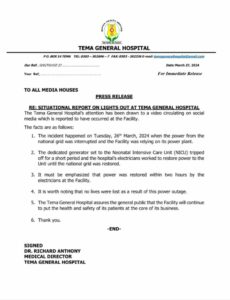
All health facilities across the country have been put for meningitis as the prevailing weather conditions predisposed people to the infection.
Head of Disease Surveillance at the Ghana Health Service, Dr. Franklin Asiedu-Bekoe, who gave the warning in an interview with the Ghanaian Times said the alert was to "quickly manage or control the disease should there be a reported case".
"Do not assume prolonged fever, headaches or neck stiffness in this period as malaria and get anti-malaria drugs from chemical sellers, rather, go to the hospital and have yourself tested and if it's negative for malaria, think of meningitis."
"Though the disease is endemic, we usually record high numbers between October and April, but in January and February which is the peak season where the weather is quite harsh we have increase surveillance across the regions so we have asked health workers to be highly suspicious of the disease," he explained.
According to the director, Ghana was seeing significant improvement in the management of meningitis with figures reducing sharply from 2,632 in 2016 to 1,118 in 2017 and 987 last year.
"This year, we have had some isolated cases of streptococcus pneumonia (a common cause of bacterial meningitis) in districts including Nandom, Jirapa and Nadowli in the Upper West Region of the country though the prevalence has not been sustained.
We normally monitor based on the World Health Organisation's (WHO) threshold where if we record about three cases per week among a population of 100,000, we could issue an alert and in the case of about 10 cases per week among same population size, we can call it an epidemic but so far, we don't have such a situation at hand," he stated.
Dr. Asiedu-Bekoe while allaying the fears of Ghanaians on a possible outbreak however did not rule out the chances of contracting the disease as "Ghana lies within the meningitis belt with other countries such as Senegal and Ethiopia".
He thus advised that "people take in lots of water and fluids at this time because the bacteria is in the throat so when the weather is dry, we tend to develop cracks there and a cough or sneeze can transfer the bacteria, cover your nose and mouth when sneezing or coughing and report early to the hospital if you are unsure of the symptoms you are having".
Meningitis is the inflammation of the membranes covering the human brain and spinal cord (meninges). The inflammation is usually due to bacterial or viral infections but may also result from parasitic infections and non-infectious agents like irritation from blood and cancer cells.
It is mainly transmitted through the inhalation of respiratory droplets such as sneezes or coughs from infected individuals.
In recent times, meningitis which used to be recorded in the Northern regions of Ghana is now seen in the southern sectors with the Brong-Ahafo Region recording about 200 deaths from meningitis.
Read Full Story























Facebook
Twitter
Pinterest
Instagram
Google+
YouTube
LinkedIn
RSS